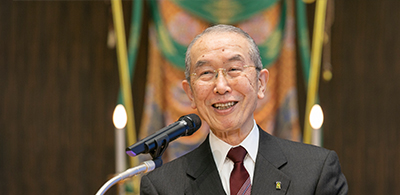Why Don’t Our Sufferings End?
May 2019

The Two Meanings of “Suffering”
When people are experiencing tremendous suffering or besieged by many hardships, we Japanese say that they are going through shiku hakku, or the “four sufferings, eight sufferings.” It is well known that shiku hakku is a Buddhist term–in fact, it describes the Buddhist view of human existence. We are born into this world, grow older, have illnesses, and die. Birth, aging, illness, and death constitute “the four sufferings.”
In addition to these are four more: being separated from what we like, encountering what we dislike, not getting what we seek, and the aggregation of these in their totality, or the suffering produced through physical and mental functioning. Taken together, these are the eight sufferings. Buddhism teaches us that these are the sufferings that human beings are saddled with.
However, Shakyamuni’s use of the word “suffering” did not seem to indicate the nuances of the word as we generally use it today–that is, to indicate the feeling that something is distressing or painful to do. “Suffering” in Sanskrit is duhkha (Pali, dukkha), which means “something that does not go as one wishes it would.”
Therefore, each of the eight kinds of suffering mentioned earlier carries the meaning that there is nothing you can do about it. Nonetheless, when you want to do something about a situation or become obsessed with it and are unable to let it go, your heart produces feelings of unpleasantness and pain.
At those times, suffering changes into feelings of suffering that torture you physically and mentally. This human condition of endlessly feeling suffering is described in chapter 2 of the Lotus Sutra, “Skillful Means,” as follows: “In the perilous path of birth and death, / Their suffering continues with no respite. / [They are] firmly attached to the five desires, / Like the yak obsessed with its own tail.”
This passage explains that because we are attached to desires, our feelings of suffering do not end. Furthermore, as the passage goes on to tell us: “Being deeply entrenched in distorted views, / Their attempts to end suffering create more suffering”–that is, when we are frustrated that we are unable to accept the fact that things do not go according to our wishes, we become anxious and more keenly feel our suffering. The scripture admonishes this state of our emotions.
Suffering Is a Source from Which Wisdom Springs Forth
There are examples we hear about, even from the people around us, of those who try to escape their feelings of suffering only to cause more suffering.
Someone who is hundreds of thousands of dollars in debt may try to end the suffering of paying off a loan by taking out another loan from another party, for example. This is one attempt to end suffering that creates more suffering, and no matter how long they might attempt to escape it, their feelings of suffering will not go away. Saigyo (1118-90), a monk and poet, lamented, “Lost in the darkness / Of this floating world, / Why do they never tire of it? / They think not of themselves, / Doing as their hearts desire.”
This poem asks us–we who feel that we are suffering because we are consumed by desires and driven by them–why we never realize what is important and change our mentality. Here, “what is important” means that you do not inflate the suffering you are facing into feelings of suffering, and that you realize that your encounter with suffering is a chance to open your eyes to wisdom. The suffering that leads to distress, sadness, anger, and pain is, unless your emotions are mixed into it, neutral (Skt., avyakrita, Pali, avyakata)–in other words, neither good nor bad.
Therefore, by coming to accept suffering and taking control of your feelings, you can bring about a major change in your life. I just mentioned the story of someone who was strapped with several hundred thousand dollars of debt. He told me clearly that when he accepted the debt as a necessary trial, he became able to think about his situation without feelings of suffering, and instead, even see it as a joy. Once we resolve to accept suffering as it is without trying to escape from it, it becomes a source from which wisdom springs forth.
If we can accept that suffering is necessary in order to activate the wisdom we innately possess, then it becomes an important signpost pointing us toward joy, and we can leave behind our feelings of suffering. This is a way of life in which you have suffering but do not feel suffering. In Buddhism, there are numerous teachings about this, such as the Four Noble Truths. However, even if we have learned them, we still feel some suffering when we encounter a source of suffering. I think it is all right if we do–after all, if we never felt suffering, we might never take up the Way leading to happiness: the Buddha’s teaching.
Back Number



